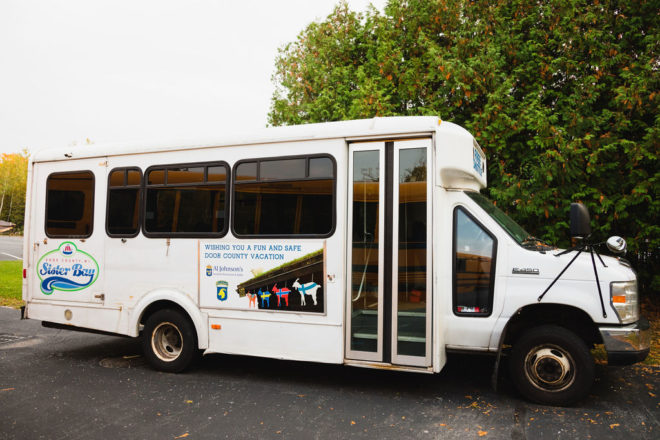With J-1 Students Arriving, Wheels Are Wanted
- Share
- Tweet
- Pin
- Share

About 420 J-1 visa students began arriving last month to work in Door County businesses – numbers not seen since before the pandemic, when 520 came in 2019 and 494 arrived in 2018, according to data from BridgeUSA.
The J-1 visa program allows college and university students to stay in the U.S. for four months, with at least two weeks reserved for travel within the country. Local businesses rely on them to fill seasonal jobs, particularly in the service industry. But traveling around Door County isn’t always easy for the J-1 students. They usually have driver’s licenses, but wheels to drive are hard to come by – whether motorized or manual.
In Need of Bicycles
Ken “The Bikeman” Hollenbeck provided a bike ministry for J-1 students for 26 years as part of Door County BRIDGES. He started with seven bikes, and by the time he retired the ministry in 2019, he said he had 400 in the barn.
Hollenbeck and his wife, Janet, were Team KJH: the two-person crew that showed up to present a worker with her or his bike for the summer. Janet recorded the necessary details to keep track of the bike, and Ken adjusted it to fit each individual. When students called for needed repairs or maintenance, Team KJH would go to the student to fix the bike.
When Hollenbeck retired the program, he gave the bikes to the businesses where the students worked, but those business owners miss the program.
“Now everyone has to figure it out for themself,” said Fred Bexell, general manager of Al’s Swedish Restaurant in Sister Bay. “It’s back to square one.”
At the Landmark Resort in Egg Harbor, getting the students to and from work isn’t much of a problem because they live on-site, said Rick Rogers, Landmark’s general manager. But the students do need to get around for basic needs, other jobs and socializing, so those at the Landmark, like at Al’s, miss Hollenbeck’s bike ministry.
“It was great, and we loved it,” Rogers said. “So when it ended, they said we could have the bikes.”
The Landmark continued to use those donated bikes for two seasons before they began to require more maintenance than staff could fix. Scrambling to replace them, Rogers found 60 bikes at a Walmart elsewhere in Wisconsin that they’ll use this season.
“We were able to work out a price on that, and this year, we’re selling the bikes to the kids, and if they return them, we’ll buy them back,” Rogers said.
Like many businesses in Door County, Al’s has solved the problem of finding housing for its employees this season – the restaurant will welcome 30-35 J-1 students “if everybody shows up,” Bexell said – but some of those housing solutions created a transportation challenge by putting the employees farther away from work.
“It’s not far, but far enough [that] we’re going to try and help with pickup and drop them off,” Bexell said.
They’ll use a van for that. But they know that most of their employees will have two or three jobs, so a bike or car is pretty crucial, Bexell said. They also have a couple of used cars that they’ll sell to students and buy back at the end of the season. But Bexell really wants bikes at a time when the pandemic-fueled biking shortage has not yet released its grip on the world, and isn’t expected to do so anytime soon.
“I’m scrambling to find bikes for the people I have,” he said.

The Airport Pickup/Drop-off Challenge
The Landmark in Egg Harbor will have 57 J-1 students this year, and the first of those students began arriving last month from Bulgaria, Croatia, the Dominican Republic, Romania, Thailand and Turkey.
That means coordinating 57 arrivals – and, eventually, departures – from various airports from Chicago to Green Bay on different days, times and weeks from May through June. Solutions for those transportation needs are important.
“We have managed to work with another business to share those costs,” Rogers said. “That would be a good countywide initiative to help coordinate those pickups.”
Sister Bay Shuttle Bus Put to Additional Use
Transportation challenges may not be as conspicuous as affordable-housing issues, but they’re always there, said Louise Howson, community coordinator for the Sister Bay Advancement Association.
Howson is uniquely positioned to assist with those challenges because her organization manages the operations of the Sister Bay Shuttle Bus. Owned and maintained by the Village of Sister Bay, the seasonal shuttle provides a wheelchair-accessible, fare-free ride that can transport 14 passengers and runs on a fixed-route schedule every 30 minutes Thursday-Saturday, June-August.
Judith Erickson learned about the shuttle while reading the Peninsula Pulse’s most recent Sustainability issue, which focused on transportation needs, challenges and services on the peninsula. She, too, had a transportation challenge as a volunteer for the Door County BRIDGES program.
The official mission of the organization is to provide friendship, assistance, group social events and helpful services to the international students who come to work in Door County. Erickson coordinates transportation for the Northern Door chapter to and from the five major activities that it plans throughout the season.
“It has been a challenge to have enough drivers for the really popular events,” Erickson said, so she sought permission to use the shuttle bus on a night when it’s not being used (Tuesdays) to transport students to some of the events, paying for the driver’s time at $20 per hour, plus gas costs. Students would be picked up and returned to three primary locations in Sister Bay.
“It’s exciting news for us,” Erickson said.
Private drivers must carry the proper insurance and may transport a limited number of students. That means numerous drivers for the Village of Egg Harbor, which was slated this year to have the second-highest number of J-1 students – 136 – next to Sister Bay, which is officially supposed to have 140.
“In the past, I would send drivers to Sister Bay, and sometimes, I’d have to send four drivers,” Erickson said. “I’ll still have private drivers, but this helps.”
Howson said she’s thrilled for the opportunity to put the shuttle to work on filling transportation needs for J-1 workers.
“If we get more riders, we add to safety; we increase available parking; and we help our businesses,” Howson said. “On so many levels, it helps everybody.”
J-1 workers sometimes use the shuttle to get to and from their jobs, but it’s not available, convenient or even feasible for most, given its limited hours and days.
“It doesn’t help shift workers,” Howson said. “Shift work is the foundation of everything we do here – everything. The majority of people who work here do shift work, at least during the season.”
That’s why Howson and her grassroots group – the Peninsula Transit Coalition – continue to advocate for more expanded uses of the shuttle and for more communities to join Sister Bay in creating additional transportation options.
“This is part of the reason [why] public transportation is important,” Howson said, “whether we’re carrying J-1s or Door County residents who live in Sturgeon Bay and work up here.”


